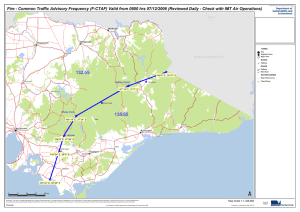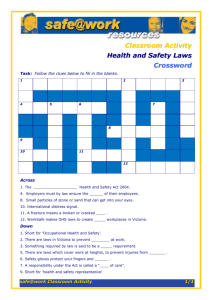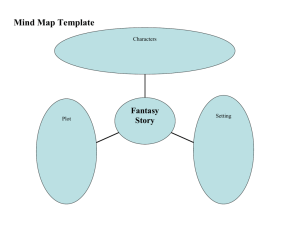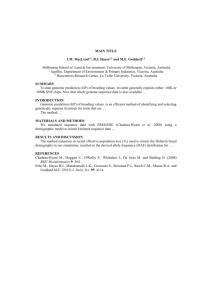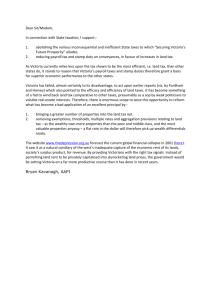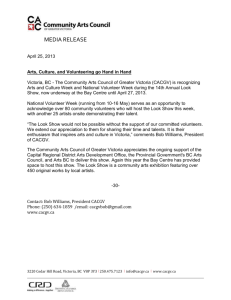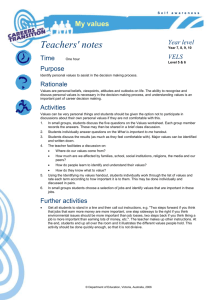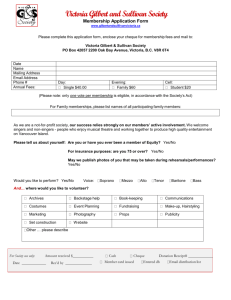Family law in Australia * dividing property after
advertisement
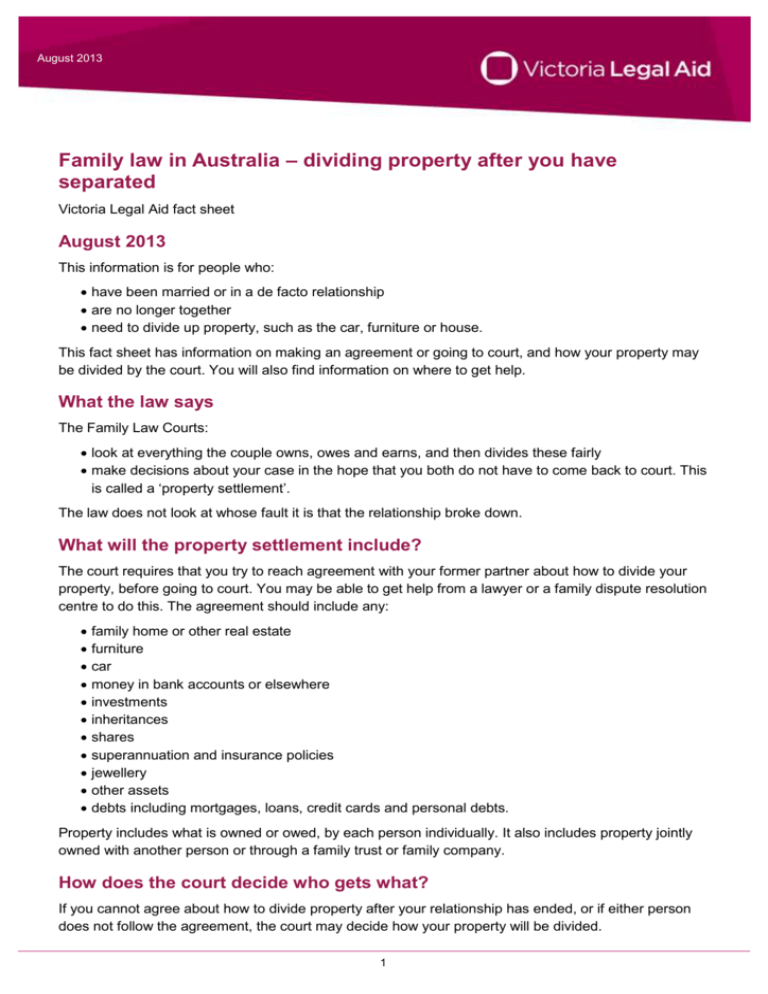
August 2013 Family law in Australia – dividing property after you have separated Victoria Legal Aid fact sheet August 2013 This information is for people who: have been married or in a de facto relationship are no longer together need to divide up property, such as the car, furniture or house. This fact sheet has information on making an agreement or going to court, and how your property may be divided by the court. You will also find information on where to get help. What the law says The Family Law Courts: look at everything the couple owns, owes and earns, and then divides these fairly make decisions about your case in the hope that you both do not have to come back to court. This is called a ‘property settlement’. The law does not look at whose fault it is that the relationship broke down. What will the property settlement include? The court requires that you try to reach agreement with your former partner about how to divide your property, before going to court. You may be able to get help from a lawyer or a family dispute resolution centre to do this. The agreement should include any: family home or other real estate furniture car money in bank accounts or elsewhere investments inheritances shares superannuation and insurance policies jewellery other assets debts including mortgages, loans, credit cards and personal debts. Property includes what is owned or owed, by each person individually. It also includes property jointly owned with another person or through a family trust or family company. How does the court decide who gets what? If you cannot agree about how to divide property after your relationship has ended, or if either person does not follow the agreement, the court may decide how your property will be divided. 1 Victoria Legal Aid Family law in Australia – dividing property after you have separated The court follows three steps to make a decision: 1. The court lists all the property and values it (including debts). This can include property you owned before your relationship or marriage, or after the relationship or marriage ended. 2. Then the court looks at what each person has given to the relationship. This includes: earnings, savings, gifts, inheritances or property owned before the relationship (including anything given to you by your family) improvements to property such as building, painting or gardening contributions as a home-maker and parent such as cooking, cleaning and child care. 3. The court looks at: how much money each person could earn in the future the age and health of each person care and financial support of any children responsibility for looking after other people the length of the relationship. The court looks at all these things to help make a decision that is fair. Making an agreement It is a good idea to first try to make an agreement about property. An agreement can be made into a court order. This is called a Consent Order which people must follow. Agreements made with the court are more difficult to change unless you both agree. Even if you both agree, the court will not make an order unless it is fair to both people. Who can help? A lawyer can help you work out an agreement with your former partner. Even if you do not use a lawyer to help with negotiations, it is very important that you get legal advice before signing any agreement. You need to get legal advice from your own lawyer, not your former partner’s lawyer. If you both use lawyers, your lawyers can communicate with each other on your behalf, to sort out an agreement. Or you can make an agreement with your former partner yourself, after getting legal advice. A family dispute resolution service can also help you to come to an agreement. A financial counsellor can help you with any financial difficulties. What if we cannot agree? You may need to go to court to apply for a property settlement. When should we apply for a court order? If you get a divorce you must apply to court for property orders within 12 months of the actual divorce date, or you need special permission. If you were not married, you must apply within two years of separating. 2 Victoria Legal Aid Family law in Australia – dividing property after you have separated Fadi and Yeasrah have separated and discussed how to divide up their property. They agreed that Yeasrah would keep most of the furniture and Fadi would keep the family car. But they couldn’t agree on how to divide their savings and some money that Yeasrah had received from her mother. They went to court for help. The judge looked at Fadi’s and Yeasrah’s contributions. Fadi had earned the money through his job at the market and Yeasrah had done all the cooking, cleaning and childcare. The judge decided to divide their savings equally because of what each person had contributed. Yeasrah was allowed to keep her mother’s gift money, as the children would be living with her and this would go towards their ongoing care. What if I am feeling unsafe? If you feel worried for your safety, feel intimidated or feel that you are unable to make decisions equally, you can get help. If you or the children feel unsafe, you should call the police quickly on 000. It is the police’s role to make sure you are safe and to help you if you are unsafe. Tell the police if you do not understand or speak English. They will get an interpreter. You can also: call services that can give you support, legal help or accommodation apply for an order that stops your former partner from making threats, or from coming anywhere near where you live and work. This is called a family violence intervention order. The order can also protect children. See our publication ‘Safe at home – how to get a family violence intervention order’ for more information on legal and other help. See the end of this fact sheet for services that can help you. What if I leave the house – do I lose my rights to property? No, you will not lose rights to the house or your things. You may be able to return at a later time. You can also protect your interest in the family home if your name is not on the title. This is called a caveat. A caveat is a written warning to anyone who checks the Certificate of Title of the property that you have an interest in it. If you do this, you will be notified of anyone attempting to register their interest or sell the property. Talk to a lawyer about this. It is best to think about your safety and the children’s safety first, and get legal help. What if I want to stay in the home and have my former partner leave? There are two ways. If your former partner is violent, you can apply for a family violence intervention order. It can be a condition of the order that your former partner not come near your home. If there is violence or if the situation is intolerable, the Family Law Courts can make an order for your former partner to leave the house. A lawyer can help you apply. What should I take if I decide to leave? It is best to take all your legal and financial papers with you, such as: birth, marriage and other certificates wills passports and visas 3 Victoria Legal Aid Family law in Australia – dividing property after you have separated bank and cheque books bank, superannuation, tax and other financial papers personal things that you are worried about leaving behind things you may need for yourself and your children. If you apply for a family violence intervention order, you can ask for the order to include that your personal property be returned to you. How can I protect my property? Keep details of everything that is owned or debts until a settlement is complete. Take copies, if you can do this safely, of any documents, such as tax returns or bank statements, that you think your partner will take or that you will want quite soon after you are separated. You may want to take photographs of property and other records. It is a good idea to start keeping records even if you are just thinking about the possibility of separating from your partner. Store your own records and documents like your passport and drivers licence, as well as any certificates, in a safe place. You can get court orders that stop property being sold or money being spent. These are called injunctions. You can also warn other people that you have an interest in any real estate, if they try to buy it. This is called a caveat. Get legal advice quickly if you want to apply for a caveat. Where to get help If you need an interpreter: Call the Translating and Interpreting Service for an interpreter to help you speak to any of the agencies in this section. Ask the interpreter to put you through to the agency you need. This is usually free. Tel: 131 450 If you are deaf or have a hearing or speech impairment: Use the National Relay Service to phone any of the agencies (including Victoria Legal Aid) in this section. This is free. For more information about the NRS visit the National Relay Service website TTY users: Call 133 677 and then ask for the phone number you need. Include the area code. Speak and Listen users: Call 1300 555 727 and then ask for the phone number you need. Include the area code. Internet relay users: Connect using this Internet Relay Service website and then ask for the phone number you need. Include the area code. Victoria Legal Aid Legal Help Tel: 1300 792 387 Open Monday to Friday, 8.45 am to 5.15 pm You can get legal information and help regarding separation, divorce, children, property and residency issues. 4 Victoria Legal Aid Family law in Australia – dividing property after you have separated Roundtable Dispute Management This service has trained dispute resolution practitioners that can help people reach agreements together about the children. Tel: 9269 0500 or 1800 136 832 (if you live in the country). Visit the Victoria Legal Aid website For more information about families and the law, see our other Family law in Australia information sheets: Separation and divorce The first step: getting help to reach agreement with the other parent After you have separated: making arrangements about the children. For your nearest community legal centre: Tel: 9652 1500 Visit the Federation of Community Legal Centres’ website Family Court / Federal Magistrates Court Tel: 1300 352 000 for Family Law National Enquiry Centre. This number can be called 24 hours Visit the Family Court of Australia website InTouch Multicultural Centre Against Family Violence Tel: 8413 6800 or country callers 1800 755 988 Visit the Intouch Multicultural Centre Against Family Violence website Call Victoria Legal Aid on 9269 0120 or 1800 677 402 (country callers) or visit your nearest office which can be found at the Victoria Legal Aid website Translating and Interpreting Service Tel: 131 450 National Relay Service TTY: 133 677 or Speak and listen: 1300 555 727 Visit the National Relay Service website for more information Acknowledgements: Victoria Legal Aid gratefully acknowledges the significant contribution made to the development of this publication by the Women’s Legal Service of Victoria, the Islamic Women’s Welfare Council of Victoria, Footscray Community Legal Centre, Wyndham Legal Service and the Chinese Community Social Services Centre Inc. © 2013 Victoria Legal Aid. Reproduction without express written permission is prohibited. Permission may be granted to community organisations to reproduce, free of any charge, part or all of this publication. Written requests should be directed to the Communications and Community Education Manager, Victoria Legal Aid. 5 Victoria Legal Aid Family law in Australia – dividing property after you have separated Disclaimer: The material in this publication is intended as a general guide only. Readers should not act on the basis of any material in this publication without getting legal advice about their own particular situations. Victoria Legal Aid expressly disclaims any liability howsoever caused to any person in respect of any action taken in reliance on the contents of this publication. Printed on 100% recycled paper DPS-CL-ENG-1111 6
